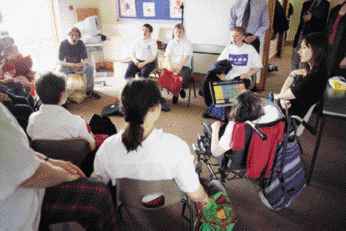|

POKESDOWN
PRIMARY SCHOOL, Bournemouth; Physical accessibility throughout the
school can assist with inclusion, as with ramps in this school.

Increasing pupil support, whether educational, social
or medical, is a key plank of inclusion.
'Where all children are included as equal partners
in the school community, the benefits are felt by all.'
Secretary of State, Excellence for all Children (1997)
|
The Government is committed
to promoting inclusion of pupils with Special Educational Needs
(SEN) and disabilities into mainstream schools as part of a wider
range of policies that recognise and celebrate human diversity.
The Special Educational Needs and Disability Act (2001) strengthens
the rights of pupils with Special Educational Needs to be educated
in mainstream schools. It places new duties on providers to make
reasonable adjustments so that disabled pupils are not at a significant
disadvantage. There is also a duty to plan for increased accessibility
to schools' premises.
Inclusion has a number of meanings all of which have an impact on
the school fabric:
• Education within mainstream schools of an increasing number
of children with disabilities;
• A broad
mix of children in terms of ability, needs, background, etc
in a single school;
• Participation of children in the full range of opportunities
provided by a school, including access to the full curriculum and
involvement with social and community activities.
The green paper Excellence
for all Children (1997) proposed that as many pupils as possible
should be educated in mainstream schools. There are many overlaps
between the increased community use of schools and increased inclusion.
'Inclusion' refers principally to a wide range of learners attending
the school full time and 'community' refers to other, part-time
users.
One of the key effects of greater inclusion is an increase in pupil
support, whether educational, social or medical. The number of para-professionals
working in schools has grown considerably in recent years. Outside
agencies are also bringing other professionals, such as educational
psychologists or social workers, into schools. Schools are also
working more closely with parents, encouraging them into schools
for meetings and general support. Where there are linked facilities
on site, such as health and social care, children with special educational
needs and their families can benefit.
All pupils need good pastoral support if they are to succeed in
their education and also feel part of the school community. There
have been a number of initiatives that aim to improve opportunities
for pupils who are not reaching their potential. Arrangements such
as mentoring, counselling and house systems can not only help pupils
feel more positive about their school experience but also reduce
behavioral problems.
|

